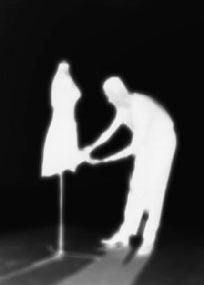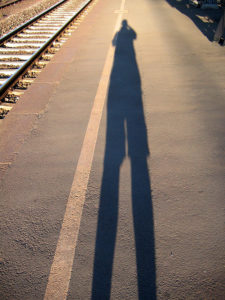A poem about the aspirations of children in poverty and the unequal funding of their education.
The test of our progress is not whether we add to the abundance of those who have much; it is whether we provide for those who have too little Franklin D. Roosevelt
I thought my schooling should be seamless
And made of rich brocade.
I dreamed its threads would be spun
Into mutable patterns
Of memory and beauty,
With light and dark shadings
Curving, intersecting,
And joined into fantastic, interwoven designs.
I saw my education cloth as having a texture —
And a sliding, slippery rhythm
As its folds would sweep and whisper
Across the cutting room table.
And with the help and guidance from my teachers
I thought I would be allowed to fashion and sew it
Into a garment that I was proud to wear — For a lifetime.
My hands would be able to sweep this majestic cloth
Caressing, feeling and remembering
Its deeply embedded patterns —
Each loop, each wondrous thread
Would be woven to suit my special talents and potentialities.
I envisioned that I would be able to see the beauty of my garment
Reflected in the awe of passersby,
In the eyes of strangers whom I met,
Expressed by friends and family.
But most of all, see it, everyday
In the visions of my reflected self.
But I have been given patched burlap rags instead.
Ones fashioned by others
Who either do not know or care
About my internal bends and curves and measurements.
This is base, bare stuff.
Leavings from others, and from long olden times —
It is chaffing, constricting and not suitable for lifetime wear.
These rough-patched raiments
Remind me that they have been passed from hand to hand,
From one time zone into the next.
There are no subtle threads or majestic shadings here.
No whispered-touch upon my skin.
And no deep, rich-etched patterns
Lie beneath a subtle sheen.
To tantalize my eyes or elevate my mind.
This plain, coarse stuff is spun for functional utility —
Merely a sparse, shabby covering.
Created by greatly sparing cost.
And I am left
Shivering, cold, disheveled,
Ashamed that others will see
What my schooling dressed me in.
Is it that I am unworthy of that other kind of cloth?
Am I too base, or low-born
For garments made of richer thread?
Did I ask too much?
Or did I try to reach too high?
They told me to be
All that I could be.
They whispered –“If only you would try but once again!”
But when I did, they sent me to the ball
Dressed in dirty rags and hand-me downs.
They wonder why I am angry,
Mad, or disbelieving.
Afraid to dance again to their disheartening and misleading tunes.
But at the ball I noticed that there were others
Who had been clothed in my sweet dreams of rich brocade.
I think my schooling should have been seamless
And made like finely woven cloth . . .
© Leslie Owen Wilson all rights reserved
Afterthoughts:
 Obviously, this is poem about the inequality of educational opportunities in this country and unequal funding. It is dedicated to the valiant efforts of Jonathan Kozol and his dynamic works on the children of poverty. It is also dedicated to my first students at PS 68, Betsy Ross Elementary School, in Baltimore. These wonderful children taught me about the extreme power of teachers to change lives, and the difference good teachers and caring attitudes can make in the lives of children.
Obviously, this is poem about the inequality of educational opportunities in this country and unequal funding. It is dedicated to the valiant efforts of Jonathan Kozol and his dynamic works on the children of poverty. It is also dedicated to my first students at PS 68, Betsy Ross Elementary School, in Baltimore. These wonderful children taught me about the extreme power of teachers to change lives, and the difference good teachers and caring attitudes can make in the lives of children.
At the very beginning of my teaching career I taught in the inner city. Although the neighborhood was lower to poor income levels, most of the children were well-loved, and clean. Some were exceptionally bright and creative. The school was immaculately kept despite being more than 100 years old. Most of the aging staff was female, caring and competent, and the female principals dynamic and forward thinking. But the neighborhood was in a state of rapid transition and decline as the blight of drugs, gangs, and extreme poverty was just beginning the devastating erosion of homes, families, and young lives.
Here, in my first class, I had 42 kids, IQs 69-152, reading levels 2nd through 8th grade. There was no help, no aide, just me and the kids. Educating these kids was grueling, exhaustive teaching, and oddly, my best educational experience ever!
I was challenged to learn to make material relevant. And I was challenged in other ways too — to learn to care about strangers’ children, deeply; to learn about the socio-economic realities of another class; to learn to be a problem solver and surrogate mother at the same time; to learn to be creative and think on my feet; to learn about both the fragility and strength of the human spirit; to learn how to be a champion for the voiceless; and finally, to learn to be humbled by what my students had to teach me. I brought those kids home with me in my heart every night, and they have stayed there for years, and years to come. They deserved more from their schooling experiences, and needed more than one single individual could give, but that was all they were given — just me.
For many years in my career as a professor of education — someone trying to prepare teachers to care — in order to sensitize my college students to the extreme injustices of unequal funding in education, I show my undergraduates the Academy Award winning documentary I am a promise. It is a movie about life and education in an inner city school of Philadelphia. Some of my students cried and were visibly upset as the film touched their hearts in new ways.
Like me, most of my students were white, middle class, and from two-parent homes. They were woefully naive about problems faced by educators in poor schools, ignorant about the culture and cycles of extreme poverty, and unknowing of the legacies of violence, welfare, and drugs. The contexts presented in this film challenged these secure realities as pictures transported watchers much better than any words I could say. I am a promise offered my students something to think about as they learned about the ultimate legacies of unequal funding and its effects on the quality of education and children’s futures.
For years Jonathan Kozol has written about the oppression of children in our land of plenty and extreme wealth. He has artfully championed the plight of inner city children and urban schools, calling others to notice the grave disparity in schooling preparation across the cities of America. Here are some of his books that have profoundly affected me.
- 1992, Savage Inequalities: Children in America’s Schools, Perennial
- 1996, Amazing Grace : Lives of Children and the Conscience of a Nation, Perennial
- 2001, Ordinary Resurrections: Children in the Years of Hope, Perennial
- 2006, The shame of a Nation, The restoration of aparteid schooling in American,(Reprint edition). Broadway Books
- 2008, Letters to a young teacher. Three Rivers Press
___________________________________________

